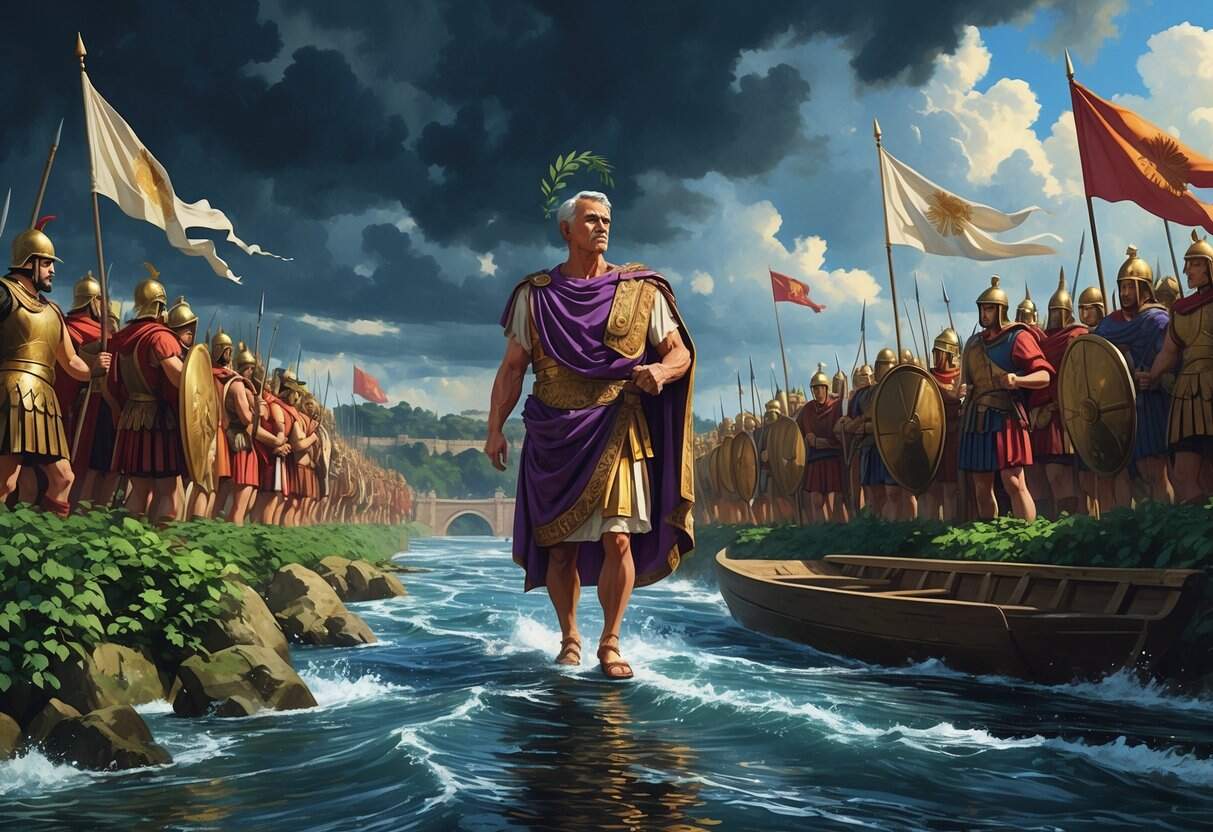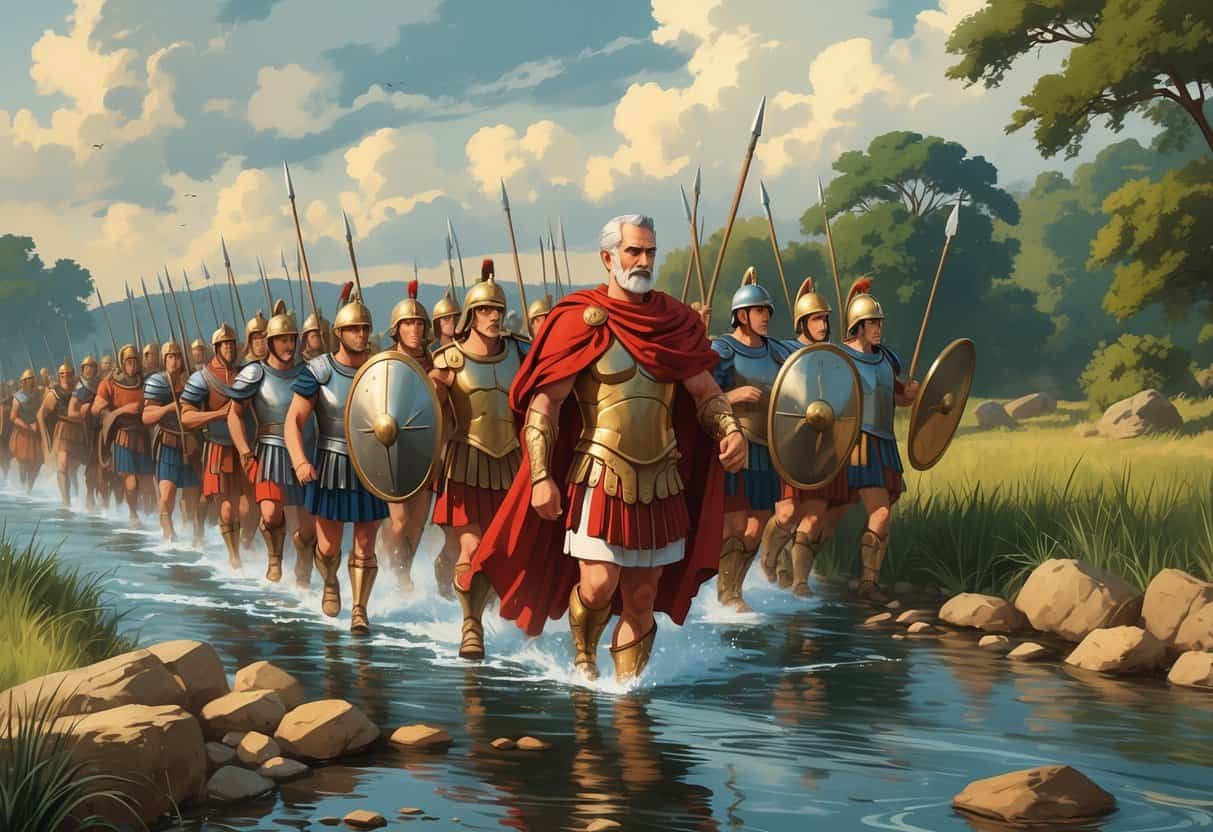Julius Caesar’s decision to cross the Rubicon River was a gutsy move that changed Roman history—no exaggeration. Crossing the Rubicon means making a choice you can’t walk back, sparking a conflict that started a civil war and ended the Roman Republic.
Understanding this moment gives you a window into how Caesar grabbed power and shifted the balance in Rome.

This study guide digs into why Caesar’s move mattered and what it meant for his climb to the top. You’ll see the risks he took, marching his army into Rome’s territory and breaking old laws meant to keep generals in check.
Knowing this story, you get a sense of how one decision can tip the scales of history. You’ll also meet the key people tangled up in this mess and the opposition Caesar faced.
Why does “crossing the Rubicon” still pop up today? Because it’s shorthand for taking a leap you can’t take back—when the stakes are sky-high.
Key Takeaways
- Crossing the Rubicon was Caesar’s point of no return.
- His actions kicked off a civil war and shifted Rome’s power structure.
- Seeing this event up close shows how crucial choices can change everything.
Historical Background of Julius Caesar’s Rise

Let’s rewind a bit. Julius Caesar’s early life, political hustle, and military wins paved his way to power.
His rise was packed with big moments: becoming consul, clashing with rivals, and conquering Gaul.
Early Life and Political Beginnings
Julius Caesar was born into a noble family, but not exactly rolling in riches. His aunt was married to Gaius Marius, a big name in the military.
Caesar married Cornelia, linking himself to the popular political crowd. Early on, he was in danger—Sulla, the dictator, wanted him dead because of those family ties.
He dodged that threat by hiding out. Not bad, right? Soon, he started his military service and began earning respect.
His first political gigs helped him build influence, even though Rome was a mess of corruption and unrest.
Consulship and Power Struggles in Rome
By 59 BCE, Caesar landed the consulship, one of Rome’s top jobs. He used it to push reforms and win over the people and the army.
During this stretch, he formed the First Triumvirate with Pompey and Crassus. That alliance kept the balance for a while, but senators like Cato weren’t thrilled.
Caesar had to walk a tightrope, using both politics and force. He wanted more influence but had to avoid getting kicked out of Rome.
The Gallic Wars and Caesar’s Ambition
After his consulship, Caesar became governor of Cisalpine Gaul and Illyricum. He launched the Gallic Wars, leading disciplined Roman legions to victory.
He faced off against tough enemies like Vercingetorix but came out on top. These wins made him famous and fueled his ambition.
The wars turned Caesar from a politician into a military powerhouse. His growing clout started making his rivals nervous.
Crossing the Rubicon: The Moment That Changed Rome
Here’s where it gets wild—a single decision that kicked off a civil war and flipped the script on Roman rule.
The Rubicon River Decision
In 49 BCE, Caesar crossed the Rubicon River, breaking a Roman law that kept generals from bringing armies into Italy. The Rubicon was the line between Gaul, where Caesar was in charge, and Rome’s heartland.
Marching his army across was a move he couldn’t undo. It was a direct challenge to the Senate and to Pompey, his top rival.
That’s why “crossing the Rubicon” still means hitting a point of no return.
Caesar’s Motivations and Ambitions
So, why’d he do it? Caesar wanted to protect his command and keep his political power. The Senate was demanding he give up his army and come back to Rome as a private citizen.
But Caesar was aiming higher than just military wins. He wanted to control Rome and shake up its political system.
He figured reforms might stabilize the Republic, but let’s be honest—he also wanted more power. Outmaneuvering rivals like Pompey and earning his army’s loyalty (not just because of birthright) was a big part of it.
Political and Military Consequences
Crossing the Rubicon sparked a civil war with Pompey’s supporters. Rome’s political system couldn’t handle the pressure.
Caesar’s rapid victories let him take the title of dictator for life. That freaked out the Senate and plenty of Romans who saw the Republic slipping away.
The war and Caesar’s rise smashed old traditions and set off major debates about leadership and stability.
Aftermath and Legacy in Western Civilization
The civil war wrapped up with Caesar on top, but it also set the stage for his assassination in 44 BCE. Senators like Brutus and Cassius thought his dictatorship was a threat to Rome’s freedom.
After Caesar’s death, the power struggle didn’t stop. Eventually, Augustus took over, and Rome became an empire.
Caesar’s crossing and reign pushed Rome toward imperial rule. His choices still echo in political thought, literature, and history. “Crossing the Rubicon” stays with us as a symbol of bold, irreversible decisions.
Key Figures and Opposition
Let’s talk about who stood with Caesar, who stood against him, and how that tension led to his downfall. These people shaped Roman history and showed just how risky Caesar’s power grab really was.
Supporters and Allies of Caesar
Caesar had some heavy hitters in his corner, like Mark Antony and Dolabella. Antony was a skilled speaker and military leader, loyal to Caesar and later a big part of keeping his legacy alive. Dolabella also backed Caesar in both politics and war.
A lot of regular folks admired Caesar for his victories and his efforts to improve Rome. His charm and sharp words helped him win over people tired of the old Senate system.
Honestly, without his allies, Caesar wouldn’t have gotten nearly as far. They helped him hold office, command armies, and push through reforms.
Caesar’s Political and Military Rivals
Pompey was the main rival—once a friend, now a foe. As Caesar’s power grew, Pompey got wary.
The Senate, with figures like Cicero and Cato, tried to block Caesar from becoming a dictator. They wanted to keep him in check and protect the Republic.
Political battles, Senate debates, and military threats were all in the mix. Caesar’s crossing of the Rubicon was his way of saying he wasn’t backing down, even if it meant civil war.
Role of Conspirators and the Path to Assassination
The conspiracy against Caesar pulled in a surprising number of senators, among them Brutus and Cassius. They were honestly worried—maybe even a bit paranoid—that Caesar’s rising power would crush the Republic and turn Rome into a monarchy.
Brutus had been a friend to Caesar, which makes his role as a leader of the plot sting a bit more. He just couldn’t let go of the old Republic’s traditions.
The assassins plotted for weeks, choosing to strike during a Senate meeting. It was a bold plan, maybe even reckless.
Cicero, for his part, criticized Caesar plenty but didn’t jump into the conspiracy himself. Still, he quietly supported the idea of bringing back the Republic’s old ways.